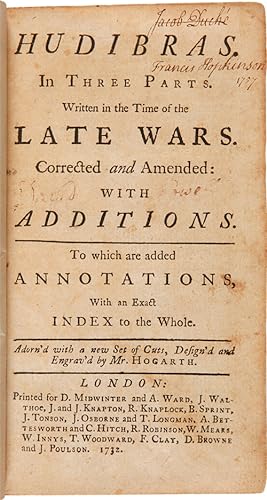Beschreibung
[2],214,197-400,[16 (of 24)]pp. plus seven plates (including frontispiece). Lacks the final four leaves of the index. 12mo. Contemporary calf, rebacked with original backstrip laid down. Light shelf wear, corners worn. Contemporary bookplate and presentation inscriptions (see below). One plate torn, lacking the lower left quarter of the sheet (repaired with blank paper). One page with early manuscript marginalia. Scattered light foxing. About very good. A remarkable association copy, connecting two significant members of the Revolutionary generation who were also united by family intermarriage, and whose friendship was riven by their divergent loyalties during the American Revolution. This copy bears the bookplate of Francis Hopkinson (1737-91), signer of the Declaration of Independence, author and poet, composer, judge, and Pennsylvania government official. The ANB calls him "arguably the most versatile American of the revolutionary generation." This book was given to Hopkinson by the noted minister, Jacob Duché, who would shortly thereafter marry Hopkinson's sister, and who famously broke with the cause of liberty during the Revolution. A front fly leaf bears the presentation inscription: "The Present of Mr. Jacob Duché Junr. to Francis Hopkinson December 1757." The same hand has signed the titlepage with the names of Jacob Duché and Francis Hopkinson and the date, 1757. On that page Duché's name has been crossed out, indicating that the inscriptions are likely in the hand of Duché, and that he crossed out his own name on the titlepage when he gave the book to Francis Hopkinson. Jacob Duché and Francis Hopkinson had a long and complicated friendship, dating back at least to their college days at the College of Philadelphia (later the University of Pennsylvania). In 1760, three years after giving him this book, Duché married Hopkinson's sister, Elizabeth. Francis Hopkinson was a prolific author and musician, and published forty poems before the Revolution. A copy of HUDIBRAS, Samuel Butler's famous satirical poem on English politics, would have been a welcome and influential gift. "During the Revolution Hopkinson wrote a number of ballads and essays poking fun at the British cause and the Loyalists. 'The Birds, the Beasts, and the Bat,' written in Hudibrastic verse, served to ridicule those persons who tried to take both sides during the Revolution" - ANB. It is impossible not to believe that one of those targets of Hopkinson's ridicule was the gifter of the present edition of HUDIBRAS, his brother-in-law, Jacob Duché. Duché (1738- 98), born into a wealthy Philadelphia family, was only twenty-two years old when he married Elizabeth Hopkinson. He would go on to become a prominent minister and religious leader in Philadelphia, noted for his well- written sermons and essays. In 1774 he was asked to serve as the chaplain to the Continental Congress, and he therefore gained political prominence as well, displaying an apparent zeal for liberty. Duché resigned his official position with the Congress in October 1776, having concluded that the Declaration of Independence - signed just three months earlier by his friend and brother-in-law - would not serve as a tool for reconciliation with England. When the British captured Philadelphia, Duché was imprisoned by General Howe, and came to a permanent change of heart regarding the revolutionary cause. In 1777 he wrote a rash letter to George Washington urging that Washington undo the Declaration of Independence and negotiate a peace. The publication of the letter destroyed Duché's career, and "those whose hearts had thrilled to Duché's eloquence now cursed him as a traitor, and even Hopkinson wrote him a burning letter of protest" (DAB). Duché and his family soon exiled themselves to London. The conclusion of the Revolutionary War did not provide Duché with an opportunity to return to the United States - anti-Loyalist sentiments were still too raw. It was not until 1792 (having by then ta. Bestandsnummer des Verkäufers WRCAM55846
Verkäufer kontaktieren
Diesen Artikel melden
![]()



